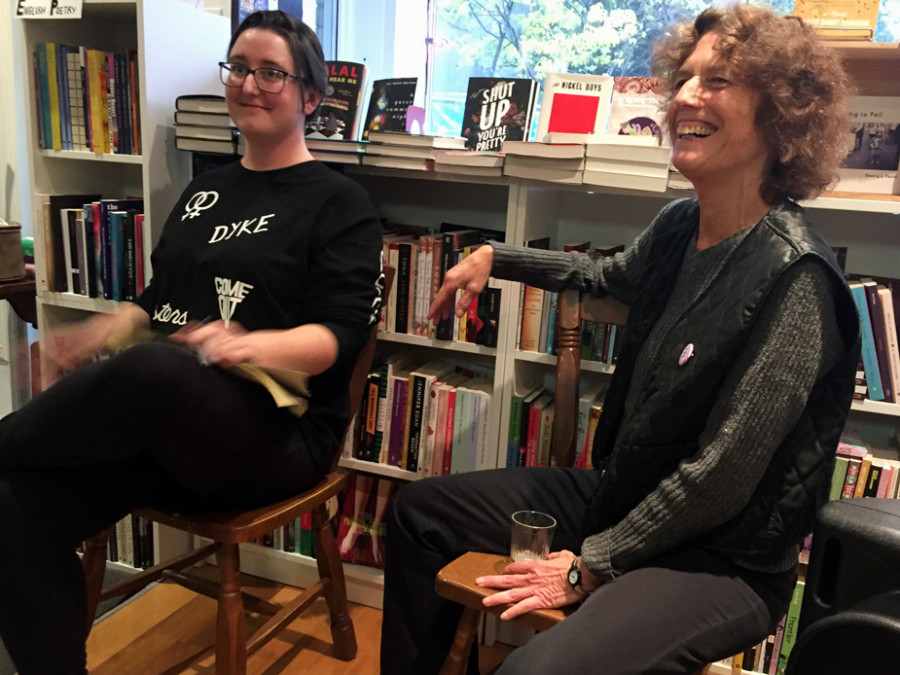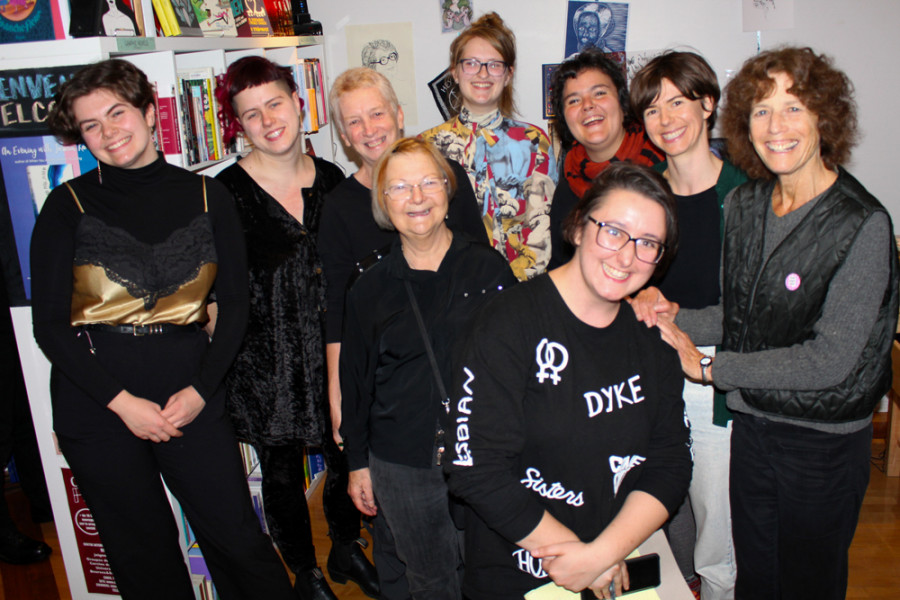Lesbian and Queer Dialogue Aims to Build Bridges At L’Euguélionne
Lesbian History and Art and Its Effects on Mondern Queer Life
A lesbian and queer dialogue was held on Sunday evening at l’Euguélionne, a feminist bookstore in Gay Village.
The event was hosted by Lise Weil, who wore a pin reading “loud angry dyke” on her vest. Weil is an award winning editor and translator. Her book In Search of Pure Lust delves into lesbian desire and its intricacies, and explores lesbianism in the 1980s.
The evening began with Weil and Anna Weick, writer of the Lesbian History & Me zine, recalling their past conversations about the different issues they faced as lesbians growing up in different generations.
Even though they come from different backgrounds, Weick said, “our values are totally aligned.”
She continued, “we want the same new world, we want capitalism to fall, we want our earth to be healed, we want people to have bodily autonomy, we want violence to end.”
Related- The Fringe Calendar: Where to Have Pre and Post Halloween Fun
- Queer Between the Covers Brings Marginalized Voices to the Forefront
Weick explained what it means to be a lesbian today, referring to a piece of hers about homonormativity and the need to conform to heterosexual standards in a homosexual relationship.
“Straight people get so much pleasure when I do anything that falls into a normative path. I have resisted being married, and nobody can handle that,” Weick said. “There’s such a pressure to fall into that normativity that looking back and seeing these beacons of incredible lesbian and queer power in history has been so illuminating.”
“I’m really attached to lesbianism as an identity, because I basically orient my life and all my energy towards women.” — Anna Weick
“I’m really attached to lesbianism as an identity, because I basically orient my life and all my energy towards women,” Weick continued, “but I also […] grew up in queer communities and I do feel like my lesbianism is queer is some ways.”
Weil is hoping that creating spaces for lesbians and queers of all ages to congregate and discuss issues in their communities will “build some bridges” between the two of them.
After the introduction of the event, several lesbian and queer artists presented their work.
Among them were Myriam Fougère, who presented excerpts of her 2012 film, Lesbiana: A Parallel Revolution. The film was a testament to 1980s lesbianism in Quebec and the United States.
Related- Queer Romance Is At the Heart of Fringe Play ‘Exits’
- ‘Lesbian Speed Date From Hell!’ Teaches Dating Etiquette
Afterwards, Weil came back to the stage to read a short bit of her book. She joked, “The book is about desire and I’m a fire sign, so I get [heated] sometimes.”
Later in the evening, Tara McGowan-Ross did a lively reading of one of her poems from her book Girth. McGowan-Ross is a queer Mi’kmaw interdisciplinary artist and Concordia graduate of psychology.
After McGowan-Ross finished reciting her poem, Weil said, “It’s a completely different experience from just reading it on paper!”
As the arts portion of the evening was coming to a close, River Halen Guri read the beginning of their essay “The Full Impulse.” Their essay brought together “a lot of threads that have been in play today: desire, gender, and history.”

Their essay discussed vulnerability and the objectification of Frida Khalo and her body documented through her paintings.
Following this came the discussion period of the event, led by Weil and Weick.
Weil recalled lesbian doctrine tearing apart gender norms, and “a woman was everything and anything.” Weil continued, “I just wanted to stop using ‘he’ altogether and use ‘she’ for everything.”
“We were still calling ourselves ‘she’ while acknowledging the full spectrum of gender,” Weil said.
Weick added, “In the 70s and 80s so many people specifically said ‘I’m a lesbian, that’s my gender.’”
According to Weick, there’s a huge difference between how lesbians described themselves in the past compared to how they identify now.
RelatedBecause younger queer people are more genderfluid and aren’t as attached to the rigidity of ‘she,’ some of the older lesbians at the event expressed they are afraid the erasure of ‘she’ will lead to the eradication of women.
One older woman said with her hand on her heart, “I’m still holding onto ‘she,’ passionately.”
At this, a younger attendee said: “people think that we’re asking them to let go of who they are [to progress with the movement]. I don’t think it’s about letting go, it’s about working together.”





_600_375_90_s_c1.jpg)
_600_375_90_s_c1.jpg)